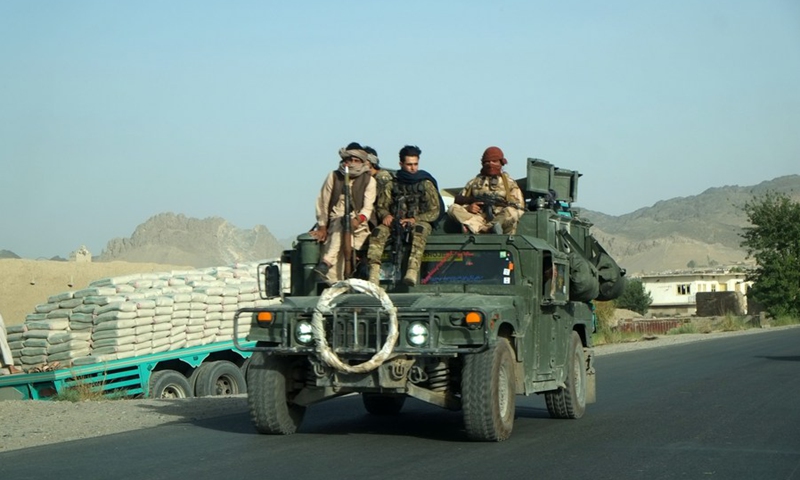
Afghan security force members are seen on a military vehicle during a military operation in Zhari district of southern Kandahar province, Afghanistan, June 22, 2021.(Photo: Xinhua)
Afghan Army chief General Wali Mohammad Ahmadzai will pay a visit to India from July 27 to 30, according to Times of India. Although the visit was scheduled several months ago, it is taking place amid the ongoing conflict between the Afghan government and the Taliban, as well as the speedy withdrawal of the US and NATO forces. This means Ahmadzai's visit is drawing wide attention.
Even though Afghan government troops seem to have been supplied with more advanced equipment, they do not have much leverage over the Taliban in terms of morale and cohesion. From the perspective of the Afghan government at this moment, it is of significance to seek more foreign support. India has been supporting the Afghan government economically and militarily by providing training and limited security equipment. By virtue of this trip, Kabul officials are expected to pursue more support from New Delhi.
The reason why India is supporting the Afghan government is mainly because it hopes for Afghanistan to be a friendly country to India— and not be too close to Pakistan. New Delhi is reluctant to see Kabul stand with Islamabad in India-Pakistan conflicts. India wants to see Afghanistan support India or at least remain neutral in the frictions between India and Pakistan.
Against the backdrop of withdrawal of US and NATO troops, the situation of Afghanistan remains uncertain. Judging from the present circumstances, the Afghan government troops might not be able to completely control the situation. Nor will it be able to eliminate the Taliban forces. In this context, the Taliban will play an important role in Afghan politics in the future. At the very least, it can participate in politics of the country, or even possibly beat the Afghan government troops and take power over the country.
The Taliban's spokesperson Suhail Shaheen recently said that New Delhi should remain neutral and not give the current Kabul administration any military support, according to Indian media outlet MINT. In this context, India has to attach importance to the interests and attitude of the Taliban. As a result, it is not a surprise to see Indian media report that India is planning to activate direct channels of communication with the Taliban.
As the Taliban do not want to see India give the current Afghan government any military support, New Delhi may not offer much help even if Ahmadzai asks for it next week during his trip to India.
What India is now pursuing is betting on both sides: While maintaining close relations with the Afghan government, it is also seeking to interact with the Taliban. New Delhi is putting its eggs in two baskets.
When it comes to India's manner toward the Afghan government and the Taliban, it may change depending on the situation. If India supports the Afghan government forces but the Taliban finally wins, the latter will be more supportive of Islamabad. Such a situation will be detrimental to India.
India's biggest concern of Afghanistan is to ensure that an anti-India and pro-Pakistan government does not emerge.
With the pullout of the US and NATO forces, India will actively promote the negotiations and peace process in Afghanistan. India has seen itself as a great power in South Asia, and even a major power on the global scale. It is willing to proactively participate in many regional and global affairs, including the Afghan issue.
The author is a senior research fellow with the Academy of Regional and Global Governance at the Beijing Foreign Studies University and president of the Chengdu Institute of World Affairs. opinion@globaltimes.com.cn




